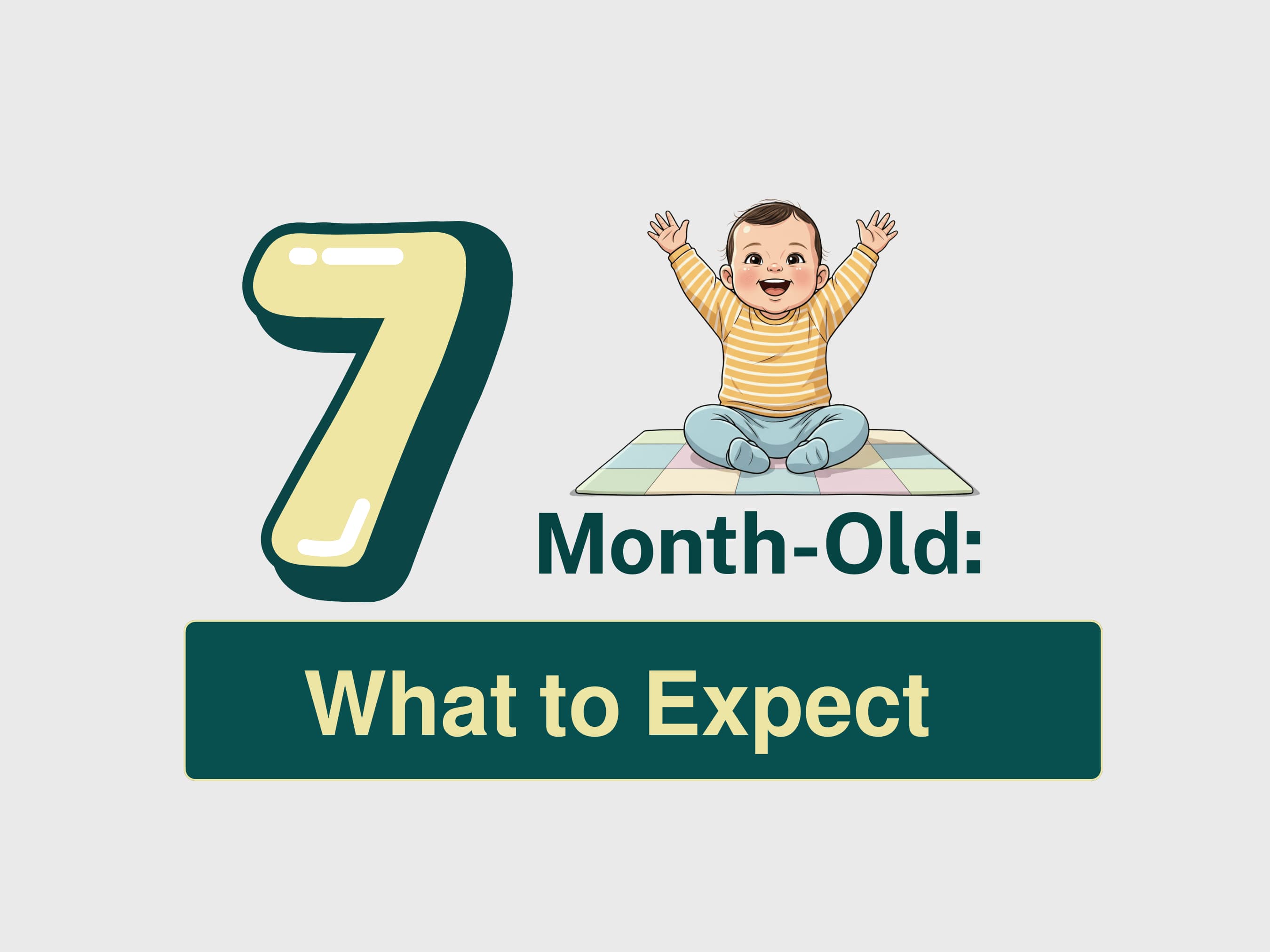7-Month-Old Baby Development and What to Expect

Written by Mindsmaking Medical Writer
Fact Checked by Mindsmaking Professionals
1st, December, 2025
Life with a 7-month-old is full of excitement and new experiences. From tasting soft foods to babbling, scooting, and exploring their world, each day brings a fresh adventure in growth and learning.
Now that your baby has reached the 7-month-old mark, their skills start to develop very fast. That tiny human who once needed full support might now be sitting on their own or with little support, and trying out solids, even though breast milk or formula is still their main source of nutrition.
Your 7-month-old baby's development actually goes beyond physical growth alone. How your baby interacts with the world, eats, sleeps, and thinks is getting better by the day. Very soon, they may be able to think for you while you rest from all your thoughts.
If your baby has not started hitting some of these milestones, it does not mean they will never do. All babies develop at their own pace. This means some babies may reach the 7-month-old milestones faster than others. The most important thing is to understand what works at this stage and how to support your baby.
Key Takeaways
By 7 months, your baby’s fine and gross motor skills are rapidly improving, letting them sit, roll, scoot, and explore the world while building balance and coordination
Around 7 months of age, your baby’s cognitive skills are expanding, as they explore cause and effect, understand object permanence, imitate actions, and practice early problem-solving.
At 7 months, your baby's social and emotional development continues to grow as they form strong attachments, exhibit separation and stranger anxiety, and express emotions through playful interactions.
Around 7 months old, your baby's language and communication skills flourish as they babble, respond to familiar voices, and imitate sounds and gestures, building the foundation for real conversation.
At 7 months old, your baby begins exploring solid foods while continuing to rely on breast milk or formula. They enjoy soft, safe finger foods and learn new tastes, with certain foods, such as honey, cow’s milk, nuts, salt, and sugar, still off-limits.
At 7 months old, babies require 12–15 hours of sleep, including naps and nighttime rest, and benefit from a consistent bedtime routine to support healthy sleep patterns, despite occasional nighttime wakings.
Supporting your 7-month-old’s development involves supervised tummy time, interactive play, daily talking and reading, responsive cuddles, and introducing soft solids to boost motor, cognitive, and social skills.
Now, health and safety focus on easing teething discomfort, keeping immunizations up to date, avoiding choking hazards, and following safe sleep practices to protect and support your baby’s growth and development.
If your 7-month-old shows delayed motor skills, limited babbling, weak grasp, or minimal social engagement, it may be time to consult a doctor for a developmental evaluation.
Physical and Motor Development
Now that your little one has reached 7 months, get ready to see their physical development in action. Their fine and gross motor skills are improving daily, and this is helping them explore the world in exciting new ways. Even small movements are becoming big achievements as they grow stronger and more confident. Real physical and motor development is now very visible at 7 months.
Here is how your 7-month-old baby is developing:
Physical and Motor Development

Sitting independently
Your baby may now sit on their own or with minimal help. They can reach for toys confidently, but keep cushions nearby because even expert sitters have the occasional tumble.

Rolling
Rolling from tummy to back and from back to tummy again is becoming smooth and intentional. Your baby is exploring their world with each roll, and turning what used to be an accidental flop into a deliberate move.

Scooting and rocking
Some babies start scooting or rocking on their hands and knees. This is their way of practicing crawling while testing how far they can get without your help.

Hand coordination
Your baby can pick up a toy with one hand, pass it to the other, or hold both hands together. Reaching and transferring objects is now easier, making playtime even more enjoyable.

Raking and pincer grasp
Early attempts at the pincer grasp (using thumb and forefinger) appear alongside raking for objects. Every tiny grasp is a milestone that shows your baby’s growing precision and determination.

Leg strength
When held under the arms, your baby may bounce or kick their legs. Those legs are learning to support weight, and each bounce is a little celebration of growing power.

Core strength
Your baby’s strength is developing at 7 months. This means longer sitting sessions, smoother position changes, and better overall balance. This lets them explore more independently, while you marvel at their new skills and try to keep up.
Cognitive Development
For a 7-month-old baby, brain development is already taking place. If you have ever wondered how your little one managed to pull off that clever trick on you, it is because they are now reaching bigger cognitive milestones. Their world is no longer just about eating and sleeping, it is now filled with testing ideas, remembering things, and figuring out how life works. Of course, this curiosity is often at your expense, so it is best to stay vigilant. Here is how your baby's brain is developing at 7 months of age:
Explores cause and effect: Your baby is learning that their actions make things happen. If they shake a rattle, it makes noise. When they drop a spoon, you will also pick it up. Another example is when you drop everything to feed them as soon as they start crying. Your baby keeps repeating these actions because they know it brings an effect.
Begins to understand object permanence: Games like peek-a-boo become a hit because they are realizing that hidden things do not just disappear. They now understand that objects exist even when out of sight.
Shows early problem-solving skills: Your little one may stretch, roll, or scoot persistently to reach a toy, or use both hands together to manage a tricky grab. This may not seem much, but it is their little way of solving immediate problems.
Imitates actions and sounds: From copying your clap to mimicking your “ba-ba” sounds, imitation is their way of learning. They are watching you closely, so yes, your little one is in training. When your baby mimics you, it shows their brain is observing, processing, remembering, and then putting things into action.
Notice differences through play: By mouthing, banging, or grabbing objects, babies begin to distinguish objects based on their textures (hard or soft) or sounds (loud or quiet). These are early steps in development and learning.
Social and Emotional Development
At 7 months, your baby’s social and emotional world starts to shine brighter. They are now showing a stronger attachment to you and other familiar faces. This is making it clear who their favorite people are. The way they light up when you walk into the room or stretch out those little arms for a cuddle is pure bliss. As simple as it may seem, this bond forms the basis of their social development.
With this deeper bond also comes baby separation anxiety. Stepping out of sight, even for a quick bathroom break, can sometimes bring tears and fussiness to your baby. It may feel overwhelming, but it is actually a beautiful milestone. It means your baby knows when you are gone and misses you. Stranger anxiety may also start creeping in, with your little one preferring the comfort of familiar faces over new ones.
At the same time, your baby is becoming more social and expressive. They now enjoy interactive games like peekaboo, clapping, or mimicking your facial expressions, and their emotions are written all over their little faces. From wide emotional expressions like smiles and belly laughs to frustrated faces and curious stares, your baby is investigating new ways to connect with you and the world.
Read This Next
No posts available
Communication and Language Skills
Your baby is now finding their voice and trying to understand how to respond to yours at 7-month-old. The quiet coos that began during their 3-month-old-baby’s development stage are now turning into nonstop chatter. Strings of “ba-ba-ba” and “da-da-da” are now echoing around the house like you have adopted a very tiny and enthusiastic parrot. This is not just noise, it is the beginning of real communication skills. They are learning that sounds connect to people, gestures carry meaning, and your voice is worth tuning into. Basically, you have now got a little copycat determined to join the conversation, whether you are ready or not. Here is what to expect at 7 months:
Babbling with repetitive sounds: Your baby practices making consonant-vowel chains like “ba-ba-ba” or “da-da-da.” These are exciting first steps toward words like “mama” or “dada,” though they may not mean you just yet.
Responding to name and familiar voices: Around this age, your baby is beginning to recognize their name and turn towards familiar voices. It is a sign that they are connecting sound with people and meaning.
Copying sounds and gestures: From coos and syllables to simple gestures like clapping or waving, babies love to imitate. This is their way of practicing the back-and-forth rhythm of real communication.
Food and Nutrition Guide
Mealtimes become more exciting and a little messier once your baby hits 7 months. Now, they are ready to explore the world of food beyond breast milk. Do not be tricked, as breast milk or formula is still their main source of nutrition. Solids right now are more about practice, discovery, and watching those funny faces they make when tasting something new than about filling their little tummies. This is about letting them join the family table, just with a more gentle menu.
This is the stage to introduce soft solids and safe finger foods. Mashed veggies, soft fruits, tiny pieces of well-cooked pasta, or even a bit of mashed beans are great starters. Watch how proudly they gum down that piece of banana, like they have just conquered Mount Everest. Offer foods in safe sizes and always stay close because solid exploration at this stage comes with a side of “oops.”
Here are foods to avoid at this stage:
- Avoid giving honey to infants until after 12 months to prevent infant botulism.
- Cow’s milk as a drink- hold off until your baby turns one, it is hard on their tummy and does not provide the right balance of nutrients yet.
- Whole nuts pose a choking hazard and should be saved for later toddler years.
- Now, your baby's tiny kidneys cannot handle salt.
- Sugar is not great for those new little teeth.
- Choking hazards, such as popcorn, whole grapes, raw vegetables, or large chunks of hard food, are all off-limits for now.
Sleep and Routine Patterns
By 7 months, your little one usually needs about 12–15 hours of sleep in total. It is spread between 2–3 naps during the day and a longer stretch at night. This sounds neat on paper, but in reality, some naps last a glorious two hours while others barely give you enough time to make coffee. Then again, there are days when your baby decides that naps are “so yesterday” and skips them altogether. This leaves you both cranky by bedtime.
This is where a consistent bedtime routine comes in to save the day. Babies love patterns, so predictable sleep patterns are better for everyone. You can transition from bathing to cuddling, storytelling, and finally, bedtime. This helps signal to your baby that it is time to sleep. The trick is to put your baby down while they are drowsy but not yet asleep. That way, when they wake in the middle of the night, they have a better chance of learning how to drift back without needing you as their personal lullaby artist.
Of course, even with the best routine, night wakings still happen. Teething gums, growth spurts, or simply the thrill of discovering they can roll, sit, or pull themselves up can keep them up at 2 a.m. While you may wonder if sleep will ever be normal again, these wakings are just part of the journey. Your baby’s brain and body are growing, and sometimes that means restless nights. Stay strong, every parent has been there. One day you will wake up to realizing they finally slept through. That moment will feel like you have won the parenting jackpot.
How to Encourage Your 7-Month-Old’s Development
At 7 months, your baby is curious about everything around them, from your voice to the texture of the floor. This is the stage where they need safe spaces to move, opportunities to interact, and plenty of cuddles to feel secure. Supporting their growth now does not require anything fancy, but it comes from everyday moments. Here is how you can encourage your 7-month-old baby's development:
- Practice supervised tummy time with your baby to build neck, arm, and core strength while preparing for crawling.
- Read, sing, and talk to your baby every day to enhance their language and communication skills, and help them connect sounds with meaning.
- Engage in interactive play with safe toys to encourage coordination, problem-solving, and social connection.
- Offer cuddles and respond to their needs to provide emotional reassurance and strengthen your bond.
- Introduce soft solids and finger foods to help your baby practice chewing, develop hand-to-mouth coordination, and explore new tastes and textures.
Health and Safety Tips
As your 7-month-old becomes more active and curious, safety and comfort are now top priorities. Here are a few ways to keep your little one healthy and secure at this stage:
Teething discomfort: By 7 months, those first tiny teeth usually start popping through, often the bottom front ones first. This can make your baby drool, chew on everything, fuss, and even skip naps. A cool teething ring, a clean finger for gentle gum massage, or a chilled washcloth can calm sore gums. Add extra cuddles because sometimes comfort works better than anything else.
Keep immunizations on track: Shots day is nobody’s favorite, but keeping vaccines up to date is one of the best gifts for your baby’s growing body. A quick cuddle or song afterward makes you the hero in their story.
Watch out for choking hazards; If it can fit through a toilet-paper roll, it is too small for baby hands and mouths. Do not give your baby objects that are small enough to be swallowed. Cut foods into safe pieces, avoid whole nuts or grapes, and baby-proof your space for curious little explorers.
Stick to safe sleep practices: Always put your baby on their back to sleep, on a firm mattress, with no pillows, stuffed animals, or loose blankets. It may not look fancy, but safety beats style every time and protects against Sudden Infant Death Syndrome (SIDS). One day, you will look back and realize how sweet that simple crib setup really was.
When to Talk to Your Doctor about a 7-Month-Old's Development
While every baby develops at their own pace, certain signs may indicate the need for professional evaluation:
Not sitting: Difficulty sitting or poor head and trunk control may point to delays in gross motor skills. When a baby struggles to sit unsupported, it can also affect their ability to explore their environment, which in turn impacts their overall development.
Lack of babbling or response to sounds: If your baby rarely coos, babbles, or turns toward familiar voices and noises, it may indicate a delay in speech and language development or potential hearing issues.
Weak grasp or disinterest in toys: A weak or inconsistent grasp may indicate muscle weakness, coordination difficulties, or delayed hand-eye coordination. Similarly, a lack of curiosity or engagement with toys can signal reduced sensory awareness.
Limited social connection: A baby who rarely smiles, avoids eye contact, or doesn’t show interest in people might be showing early signs of social or emotional delay. This could relate to challenges in communication, attachment, or, in some cases, early indicators of neurodevelopmental conditions such as autism spectrum disorder (ASD).

Was this article helpful?
How many stars are you giving this article?
Leave a comment
Your email address will not be published.